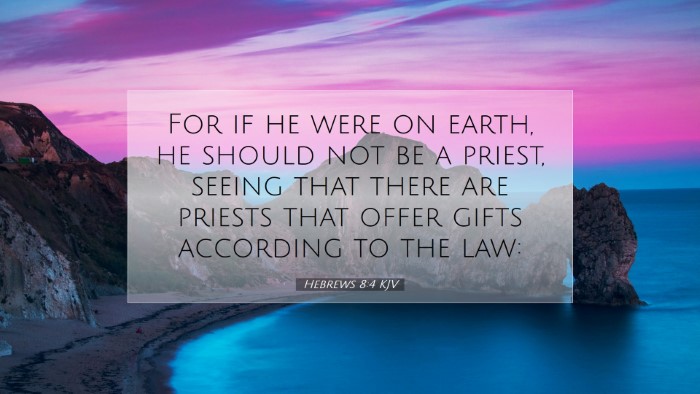Old Testament
Genesis Exodus Leviticus Numbers Deuteronomy Joshua Judges Ruth 1 Samuel 2 Samuel 1 Kings 2 Kings 1 Chronicles 2 Chronicles Ezra Nehemiah Esther Job Psalms Proverbs Ecclesiastes Song of Solomon Isaiah Jeremiah Lamentations Ezekiel Daniel Hosea Joel Amos Obadiah Jonah Micah Nahum Habakkuk Zephaniah Haggai Zechariah MalachiHebrews 8:4
Hebrews 8:4 KJV
For if he were on earth, he should not be a priest, seeing that there are priests that offer gifts according to the law:
Hebrews 8:4 Bible Commentary
Commentary on Hebrews 8:4
Text: Hebrews 8:4 (KJV) - "For if he were on earth, he should not be a priest, seeing that there are priests that offer gifts according to the law."
Introduction
The epistle to the Hebrews presents profound theological insights, particularly in its comparison between the old covenant and the new covenant established in Christ. In Hebrews 8:4, the author underscores a critical distinction between the earthly priesthood linked to the Mosaic Law and the heavenly priesthood of Jesus. This commentary aims to delve into the theological implications and practical applications of this verse, integrating the analyses of notable public domain commentaries.
The Context of Hebrews 8
Hebrews 8 continues the themes established in chapters 7. The author has been discussing the superiority of Christ’s priesthood as compared to that of Aaron and the Levitical priests. The first several verses of Hebrews 8 introduce the concept of Jesus as the mediator of a better covenant, established upon better promises.
Insights from Previous Commentaries
Matthew Henry's Commentary
Matthew Henry emphasizes the significance of the location of Christ's priesthood. He points out that Jesus, although He operates as a priest, is not an earthly priest. Instead, His ministry occurs in the heavenly sanctuary. Henry notes, "No man can share between priesthood and kingship on earth as Christ does in heaven." Jesus’ role is unique and transcends the traditional boundaries set by the Mosaic law.
Henry also highlights the necessity of the new covenant and argues that the earthly priesthood was limited and temporary. The Levitical priests served until Christ came, fulfilling the role of the ultimate High Priest. He stresses the obsolescence of the old covenant priests when measured against the eternal and divine priesthood of Christ.
Albert Barnes' Notes on the New Testament
Albert Barnes brings a scholarly perspective by discussing the implications of Jesus not being a priest on earth. He states that since Jesus is exalted and serves in the true tabernacle that the Lord pitched, not man (Hebrews 8:2), His earthly ministry would not qualify Him under the demands of the Levitical Law.
Furthermore, Barnes elucidates that the phrase "that offer gifts according to the law" refers to the priests performing the sacrificial duties that align with the Mosaic Law. He remarks, "Christ’s ministry differs essentially from that of the Aaronic priests, as His atonement and priestly work cannot be replicated by those bound by temporal rituals." His commentary affirms that since He occupies a heavenly priesthood, He is hence superior to the former system.
Adam Clarke's Commentary
Adam Clarke focuses on the nature of Christ's priesthood, noting that it is of a different classification than the priests of the law. He explains, "The priesthood of Jesus Christ is spiritual; it is eternal, and it is unchangeable," highlighting the permanence of Christ's office. In Clarke's view, the earthly priests served to foreshadow and point to the ultimate sacrifice that Christ would fulfill.
Clarke also remarks on the practical implications of this distinction. Since Christ cannot be an earthly priest, he implies that believers have a better access to God through Him, who intercedes on their behalf in the heavenly realm. Therefore, believers should not seek favor through earthly mediators, but rather through Jesus Christ alone.
Theological Implications
The claim that if Christ were on earth, He could not serve as a priest, serves to authenticate the reality of His heavenly ministry. The author of Hebrews asserts that the former system is obsolete and has been made irrelevant through the establishment of the new covenant. It confirms the belief that Jesus' work covers not only the ceremonial laws but also addresses spiritual needs in a more profound and far-reaching manner.
Contrast Between Earthly and Heavenly Priesthood
- Earthly Priesthood:
- Limited to the physical tabernacle and temple.
- Subject to earthly rituals and laws.
- Temporary and requires continual sacrifice.
- Heavenly Priesthood:
- Serves in the true heavenly sanctuary.
- Offers the once-for-all sacrifice, not repeated.
- Eternal and unchanging, ensuring perpetual access to God.
Practical Applications
For pastors, theologians, and students of Scripture, Hebrews 8:4 serves as a reminder of the importance of understanding the nature of Christ’s ministry. It calls for a re-evaluation of how believers view mediators in their relationship with God. The privileges afforded to believers through Christ emphasize personal access to God, free from earthly intermediaries.
Encouragement for Believers
Believers are encouraged to understand that their relationship with God is direct through Christ, who intercedes for them with authority and compassion. This understanding can inspire confidence in prayer and worship, knowing that they are not relying on a flawed earthly ministry, but on the perfect and divine ministry of Jesus.
Call to Leadership
For church leaders, it is critical to communicate the nature of this heavenly priesthood to their congregations. Teaching about the continuity and consummation of God’s redemptive plan through Christ helps in nurturing spiritual maturity among believers.
Conclusion
Hebrews 8:4 encapsulates a pivotal element of Christian theology, contrasting the limitations of the earthly priesthood with the eternal efficacy of Christ’s superior priesthood. As pastors and theologians reflect on this verse, they are reminded of the grace afforded to them through Christ, the heavenly priest, who has ushered in a new covenant, fulfilling and completing the old.


